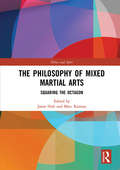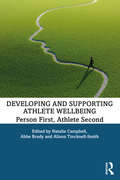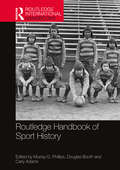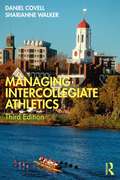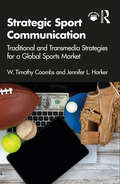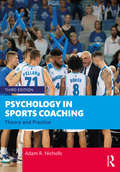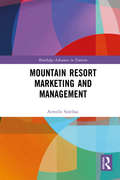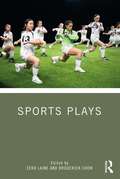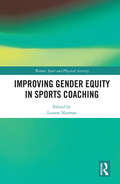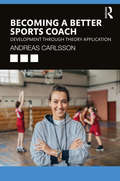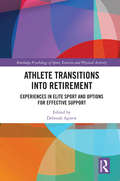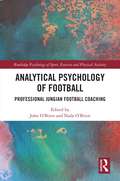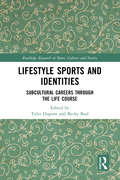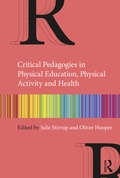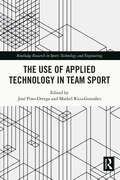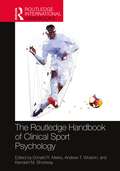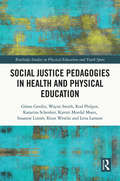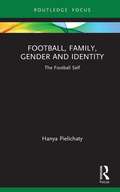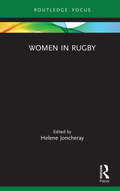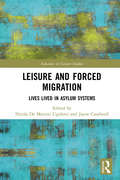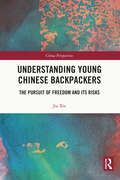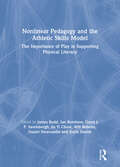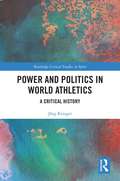- Table View
- List View
The Philosophy of Mixed Martial Arts: Squaring the Octagon (Ethics and Sport)
by Jason HoltMixed martial arts (MMA)—unarmed fighting games permitting techniques derived from a variety of martial arts and combat sports— has exploded from the fringes of sport into a worldwide phenomenon, a sport as controversial as it is compelling. This is the first book to pay MMA the serious philosophical attention it deserves. With contributions from leading international scholars of the philosophy of sport and martial arts, the book explores topics such as whether MMA qualifies as a martial art, the differences between MMA and the traditional martial arts, the aesthetic dimensions of MMA, the limits of consent and choice in MMA and whether MMA can promote moral virtues. It also explores cutting-edge practical and ethical topics, including the role of gender in MMA, and the question of whether trans athletes should be allowed to compete in the women’s divisions. The contributors to this anthology take down, ground and pound, and submit many essential questions about this fascinating recent development in the culture of sport and spectacle. This is important reading for anybody with an interest in combat sports, martial arts, or the philosophy, sociology, culture or history of sport.
Developing and Supporting Athlete Wellbeing: Person First, Athlete Second
by Abbe Brady Natalie Campbell Alison Tincknell-SmithThis pioneering book in elite athlete wellbeing brings together the narratives of athletes and wellbeing practitioners in high-performance sport with cutting-edge theorizing from world-leading academics to explore pertinent mental wellbeing matters that present for elite athletes both during and after their careers. The journey of the elite athlete is considered from entering the high-performance system as a youth performer through to retirement, with contributions illuminating the ways in which mental wellbeing can be impacted – both negatively and positively – through common place experiences. Methods of creating holistic high-performance sports cultures along with common mental wellbeing influencers, such as parents, education, faith, injury and (de)selection are explored, as well as the ramifications of uncommon events on mental wellbeing, such as whistleblowing, legal disputes, psychological disorders and COVID-19. Drawing on this analysis, the book then proffers thought-provoking strategies for how the mental wellbeing of both athletes and staff can be understood, developed and supported, ultimately driving elite sport cultural transformation to put the person first and the athlete second. Each chapter presents the wellbeing experience from the vantage of the athlete or the wellbeing practitioner, followed by an academic unpacking of the situation. This makes the book a must read for students and researchers working in sport coaching, sport psychology, applied sport science or sport management, as well as practitioners interested in facilitating a duty of care for high performing athletes, and working in coaching, sport science support, athlete development programs, NGB policy and administration or welfare services.
Routledge Handbook of Sport History (Routledge International Handbooks)
by Murray G. PhillipsThe Routledge Handbook of Sport History is a new and innovative survey of the discipline of sport history. Global in scope, it examines the key contemporary issues in sports historiography, sheds light on previously ignored topics, and sets an intellectual agenda for the future development of the discipline. The book explores both traditional and non-traditional methodologies in sport history, and traces the interface between sport history and other fields of research, such as literature, material culture and the digital humanities. It considers the importance of key issues such as gender, race, sexuality and politics to our understanding of sport history, and focuses on innovative ways that the scholarship around these issues is challenging accepted discourses. This is the first handbook to include a full section on indigenous sport history, a topic that has often been ignored in sport history surveys despite its powerful upstream influence on contemporary sport. The book also reflects carefully on the central importance of sport history journals in shaping the development of the discipline. This book is an essential reference for any student, researcher or scholar with an interest in sport history or the relationship between sport and society. It will also be fascinating reading for any historians looking for fresh perspectives on contemporary historiography or social and cultural history.
Managing Intercollegiate Athletics
by Daniel Covell Sharianne WalkerManaging Intercollegiate Athletics is the leading introduction to the management and governance of college sport. Now in a fully revised and updated third edition, this book reveals the inner workings of athletic departments and the conferences and governing organizations with which they work, offering insider perspectives to help prepare students who are interested in pursuing a career in collegiate athletics management. Written in a user-friendly style, and containing real world cases, data and examples in every chapter, the book introduces the key managerial concepts that every successful professional needs to know, and takes the reader through the core management process and functions, from goal-setting and strategy to recruiting, finance and change management. With a strong focus on practical skills, the book also encourages critical thinking and includes interviews with successful practitioners in every chapter. This new edition includes a brand-new chapter on professional development and expanded coverage of ethical issues, diversity and social justice in sport. It contains new case studies and examples throughout, and has been updated to reflect changes to NCAA bylaws and legislation. This is an essential textbook for any course on intercollegiate athletics and invaluable supplementary reading for any courses on sport management, sport marketing, sport fundraising, sport governance or higher education management. The book is accompanied by updated online resources, featuring PowerPoint slides and an instructor manual.
Strategic Sport Communication: Traditional and Transmedia Strategies for a Global Sports Market
by W. Timothy Coombs Jennifer L. HarkerAuthors Coombs and Harker provide step-by-step guidance on how the strategic communication process—an integration of marketing communication, public relations, and advertising—can be applied to sports communication for individual athletes, teams, and leagues. The book is founded on the premise that the strategic communication process in sport communication is grounded in understanding the fans and sources of revenue. Looking at sports globally, it offers readers the traditional multi-step, linear approach to strategic communication message development along with the transmedia narrative transportation method, a non-linear approach that centers on narratives to engage target audiences and urge them to contribute their own material to messaging. With case studies and practical examples, it also highlights additional issues such as race and gender, social media, ethics, and athlete health. It is an ideal text for undergraduate and graduate courses in public relations or strategic communication and sport communication. An online instructor’s manual accompanies the text, including lecture slides; a sample strategic sports communication plan; a test bank; links to key web sites that discuss sports and sports communication concerns; links to case studies with class discussion prompts; sample assignments; a sample course syllabus; and suggestions for further reading.
Psychology in Sports Coaching: Theory and Practice
by Adam R. NichollsThe most effective coaches understand the fundamentals of sport psychology, which include interacting effectively with athletes, creating the optimal environment, assessing the psychological needs of their athletes, and providing them with the mental training required to maximise performance. Fully revised and updated, the third edition of Psychology in Sports Coaching clearly and accessibly introduces the principles and practice of sport psychology in the context of the coaching process. Drawing on the very latest research and theory, the book introduces the psychological tools and techniques that coaches can use to get the best performances out of their athletes. Including three new chapters on the constraints approach to assessing psychological needs, mental imagery, managing perfectionism tendencies, and mentoring leaders, the book also offers step-by-step guidance on key topics such as: Assessing the needs of athletes Facilitating awareness through goal setting and performance profiling Coaching specialist populations effectively (e.g. children, adolescents, adults and athletes with learning disabilities) Reducing favourable attitudes towards doping Developing effective coach-athlete relationships Reducing choking under pressure Mindfulness techniques Mental imagery Every chapter contains useful features to aid learning and understanding, including in-depth case studies, critical thinking questions, clear and concise summaries, and practice exam questions. Psychology in Sports Coaching is essential reading for any student of sports coaching, or any practising coach looking to extend and develop their skills, and useful applied reading for students of sport psychology.
Mountain Resort Marketing and Management (Routledge Advances in Tourism)
by Armelle SolelhacMountain resort tourism is a competitive environment, experiencing increasing growth in new markets such as China, that require the knowledge and skills developed by mature markets. This book provides these insights by offering a critical and up-to-date examination of the mountain industry. This book covers branding, management, and revenue optimization in an industry where very heavy investments are requested and mature markets need to ensure they remain competitive. Chapters include interviews with professionals and international experts on mature markets to shed light on the development and marketing strategies that make these resorts successful. Major issues facing mountain resorts today are addressed, including climate change, sustainability, COVID-19, the experience economy, yield management and dynamic pricing policies, and investment management. Offering valuable knowledge on how to successfully market and manage ski resorts in an ever-changing and competitive environment, this will be useful reading for upper-level students, researchers and current practitioners in winter sports, destination development and management, sport tourism, and development studies.
Sports Plays
by Sports PlaysSports Plays is a volume about sports in the theatre and what it means to stage sports. The chapters in this volume examine sports plays through a range of critical and theoretical approaches that highlight central concerns and questions both for sports and for theatre. The plays cut across boundaries and genres, from Broadway-style musicals to dramas to experimental and developmental work. The chapters examine and trouble the conventions of staging sports as they open possibilities for considering larger social and cultural issues and debates. This broad range of perspectives make the volume a compelling resource for students and scholars of sport, theatre, and performance studies whose interests span feminism, sexuality, politics, and race.
Improving Gender Equity in Sports Coaching (Women, Sport and Physical Activity)
by Leanne NormanThe sport coaching profession has historically been and continues to be a White male-dominated occupation and this remains a global issue. This imbalance persists despite an improvement in wider social attitudes and legislation towards equality and diversity within many societies, and despite the action by sporting organisations and national governing bodies. Within the research literature, the underrepresentation of women in sport coaching is a well-documented issue with a number of research studies highlighting the experiences and impact of being in the minority for women coaches. The issue of gender inequity in sport coaching is a long-standing one and shows little sign of changing significantly anytime soon. Therefore, a new approach is needed, one that draws on the knowledge and evidence we have to create actionable, sustainable, deep-rooting interventions that challenge the issue of gender equity at its very core. The overall purpose of Improving Gender Equity in Sports Coaching is to take an action or forward-thinking approach about what works, or could work, to improve the recruitment, development, or promotion of women sport coaches. The book brings together a global group of esteemed scholars working in this subject area. In this book, we have brought together not just the insight but also a collection of strategies and recommendations as to how this research could be or has been utilised to make our sport coaching envrionment places where all coaches feel as though they belong. As such, this ground-breaking book is a must read not just for students and researchers of gender equity in sport but also for policy and decision-makers working in sport.
Becoming a Better Sports Coach: Development through Theory Application
by Andreas CarlssonResearch on coaching education and development highlights, repeatedly, the difficulties of traditional coaching education to impact coaching practice. Practice seems to be disconnected from scientific theory with few coaches accessing the scientific literature as it too often is presented in dry, academic tones. This volume sets out to provide an integration of theory and everyday practice that to date has not yet been published in the field of coaching science in a text easily used by sports coaches. In order to bridge this theory to practice gap, Becoming a Better Sports Coach: Development through Theory Application presents theory and science connected to practice in a way that makes it possible for coaches to test, evaluate and improve upon their existing coaching practice. This hands-on approach sets out to improve coaches’ cognition and raising self-awareness as well as improve coaches' learning using specific tools for behavioural feedback and reflection. Improving on self-reflective skills and eliciting feedback on the coach’s own behaviour is how coaching practice is improved. What coaching practice includes and what is laid out for coaches in this new text is motivational climate, coaching behaviours, pedagogy, feedback, coach–athlete relationship, each in one chapter. Reflection and behavioural feedback are applied to each of these areas.
Athlete Transitions into Retirement: Experiences in Elite Sport and Options for Effective Support (Routledge Psychology of Sport, Exercise and Physical Activity)
by Deborah AgnewTransitions in sport can be either normative (relatively predictable) or non-normative (less predictable) and are critical times in the development of athlete’s careers. While retirement from sport is inevitable, the timing of retirement can be less predictable. If an athlete copes well with the transition they may be better able to adjust to life after sport. However, not coping with the transition can lead to a crisis and negative consequences for the athlete. Transition periods from sport and in particular retirement from sport have been identified as high-risk periods for athletes in terms of psychological distress. However, circumstances surrounding the athlete’s retirement are a critical factor in the transition into life after sport. Voluntarily retiring from sport for example, leads to a smoother transition than being forced into retirement through injury or deselection. Research indicates that retirement from sport should be seen as a process rather than a single moment, with many athletes taking up to two years to successfully transition out of sport. Currently, there are few bodies of work that are solely devoted to retirement transition. Athlete Transitions into Retirement: Experiences in Elite Sport and Options for Effective Support provides contemporary viewpoints on athlete transitions from elite sport in a global context. This volume is a collaboration of research from leading authors around the world, offering global perspectives to athlete transitions into retirement and is key reading for both researchers and practitioners in the fields of Sport Psychology and Coaching as well as the Athletes themselves.
Analytical Psychology of Football: Professional Jungian Football Coaching (Routledge Psychology of Sport, Exercise and Physical Activity)
by Nada O’Brien John O’BrienJungian psychology of football is a new and cutting edge approach being applied by Champions league teams and used in youth football training. Implications for the wider role of football organisations in society as models for the diagnosis and management of trauma and tension in our changing world are highlighted. Analytical Psycholog y of Football: Professional Jungian Football Coaching provides for youth trainers, accessible, scientifically based tools and techniques to develop resilience and sustain motivation in grass roots and elite footballers. The values and psychological make-up of best in class international trainers are revealed, and commented upon by a Champions League manager. Theory is traced from the early history of the game through to the present day, equipping trainers with the guiding psychological concepts which are shaping the future of the sport. Case examples of how the game can support society through periods of change, and in fact, advance civilisation are described. A Jungian appreciation of the transformational power of the football is a step forward for psychologists, and educators who wish to keep up with advancements in their professions, for football students and for trainers wishing to remain competitive.
Lifestyle Sports and Identities: Subcultural Careers Through the Life Course (Routledge Research in Sport, Culture and Society)
by Tyler DupontThis book examines how different stages of adult life affect participation in lifestyle sports and in the construction of identity. Drawing on multi-disciplinary perspectives, it explores how gender, sexuality, ethnicity, and location, in conjunction with age and stage in career, affect lifestyle sport practices and meanings. Tracing engagement with lifestyle sport across the lifecourse, from young adult to older age, the book examines the concepts of authenticity and identity in subcultural and alternative sports, exploring how individuals develop lifestyle sport identities, maintain authentic identities, and how they manage those identities as older adults. It presents a range of fascinating, cutting-edge case studies from around the world, covering sports as diverse as climbing, surfing, mountain biking, skateboarding and roller derby, and considers key contemporary issues such as professionalisation, sports labor, and digital technology. It also highlights political tensions and shifts that shape the identities of lifestyle sport communities. This is essential reading for anybody with a serious interest in alternative or lifestyle sports, the relationships between sport and wider society, or the development of subcultures and cultural identity.
Critical Pedagogies in Physical Education, Physical Activity and Health
by Julie Stirrup Oliver HooperCritical Pedagogies in Physical Education, Physical Activity and Health explores critical pedagogy – and critical work around the body, health and physical activity – within physical education. By examining the complex relationships between policies and practice, and how these are experienced by young people, it elucidates the need for critical pedagogy in contemporary times. With contributions from leading international experts in health and physical education, and underpinned by a critical, socio-cultural approach, the book examines how health and physical education are situated across various international contexts and the influence of policy and curriculum. It explores how health is constructed by students and teachers within these contexts as well as how wider spaces and places beyond formal schooling influence learning around the body, health and physical activity. Finally, it considers what progressive pedagogies might ‘look like’ within health and physical education. Chapters utilise empirical work within the field to explore various topics of relevance to critical pedagogy, drawing on theoretical insights while providing practical applications and concluding with reflection points to encourage readers to consider the relevance for their own contexts. Designed to support pedagogical study in a range of contexts, this book will be of particular interest to undergraduate and postgraduate students, teachers and researchers with an interest in physical education, physical activity and health and the role they play in young people’s lives.
The Use of Applied Technology in Team Sport (Routledge Research in Sports Technology and Engineering)
by José Pino-Ortega Markel Rico-GonzálezThe use of technology within sport is well established, most professional sport teams engage in the use of electronic performance and tracking systems. This book is the first to offer a deep and structured examination of these technologies and how they are used in a team sport setting. The Use of Applied Technology in Team Sport describes and assists researchers, academics and professionals with understanding the methodology around applied technology in sport, examining what systems track players’ performance and who are the manufacturers that provide these systems. This new volume goes on to describe how to apply the systems, highlights the ways of reporting analysis information and helps the reader to know and understand the future avenues of research and development. The Use of Applied Technology in Team Sport is considered an essential guide for researchers, academics and students as well as professionals working in the areas of Applied Sport Science, Coaching, and subjects relating to Physiology, Biomechanics, Sports Engineering, Sports Technology and Performance Analysis in Sport.
The Routledge Handbook of Clinical Sport Psychology (Routledge International Handbooks)
by Donald R. Marks Andrew T. Wolanin Kendahl M. ShortwayClinical sport psychology is a rapidly growing field that brings together research and clinical interventions from both clinical psychology and sport and performance psychology. Complementary to sports medicine and clinical sport psychiatry, clinical sport psychology addresses the mental health needs and psychological well-being of athletes, coaches, and other members of the sport community. It offers scientifically informed conceptualizations of psychological distress as it manifests in sport settings, as well as empirically supported clinical interventions tailored to the needs of sport populations. This volume addresses the latest research findings regarding mental health among athletes and other sport professionals, including epidemiological research concerning depression, anxiety, eating disorders, and conduct and interpersonal problems. In addition, it explores the unique etiology of mental health problems among athletes, including psychological sequelae of injury and trauma, as well as concise practice guidelines for conceptualizing and treating psychological distress in sport populations. Strategies for thorough yet efficient psychological assessment of athletes, coaches, and other sport professionals are also provided. A compendium of relevant empirical research and clinical best practices for assessment and treatment, this handbook charts the course that clinical sport psychology has taken since its inception as a distinct clinical specialty and highlights future directions for this rapidly growing practice domain. It offers essential reading for psychologists and other mental health professionals who provide clinical services in sport and performance settings.
Social Justice Pedagogies in Health and Physical Education (Routledge Studies in Physical Education and Youth Sport)
by Katarina Schenker Göran Gerdin Wayne Smith Rod Philpot Kjersti Mordal Moen Susanne Linnér Knut Westlie Lena LarssonThis book makes the case that school Health and Physical Education (HPE) can make a unique contribution to young people’s physical, emotional and social health outcomes when teachers of HPE engage in pedagogies for social justice that emphasise inclusion, democracy and equity. Drawing on observations and teacher interviews across Sweden, Norway and New Zealand, the book explores successful school teaching practices that promote social justice and equitable health outcomes. In particular, it draws attention to the importance of building relationships, teaching for social cohesion and explicitly teaching about and acting on social inequities as pedagogies for social justice. The book also argues that context matters and that pedagogies for social justice need to recognise how both approaches to, and focus on, social justice vary in different contexts. This is essential reading for academics and students interested in social justice and working in the fields of education, HPE and teacher education.
Football, Family, Gender and Identity: The Football Self (Critical Research in Football)
by Hanya PielichatyThis book presents a cross-disciplinary examination of the lived experiences of girls and women football players using theoretical insights from sports studies, psychology, sociology and gender studies. It examines the concept of ‘the football self’ – your own, personal football identity that encapsulates the importance of football to our everyday lives – and what that can tell us about the complex relationships between sport, family, gender and identity. The book draws on in-depth ethnographic research involving players and family members, and offers important new insights into the everyday experiences of those girls and women who play. It breaks new ground in focusing on the significant relationships between player and family with a particular focus on parenting through football. The book brings to the fore key debates around gender identity, barriers to participation, cultural gaps and discrimination. The author also brings a personal perspective to bear, drawing on experience gained over 20 years as a player, adding an extra critical layer to her important empirical research. This is essential reading for all researchers and students with an interest in football, sport studies or issues around gender, inclusion or the family in sport, and fascinating reading for anybody generally curious about football.
Women in Rugby (Women, Sport and Physical Activity)
by Helene JoncherayThis is the first book to introduce key themes in the study of women’s rugby from multi-disciplinary perspectives, including history, sociology, gender studies, sport development and sport science. Featuring contributions from leading researchers and former international players from across Canada, England, France, New Zealand and the USA, the book opens with a global history of women’s rugby, locating the game in the wider context of the development of women’s sport and exploring important social issues such as race, gender and violence. The book then looks at training and performance analysis at pitch level, helping the reader get a sense of the game from the ground up, before focusing on women’s rugby through the eyes of others (such as rugby coaches), women’s experiences of rugby’s culture and promotional culture. This is fascinating reading for anybody with an interest in women’s sport, rugby, sport and social issues, sport development, or sport history.
Leisure and Forced Migration: Lives Lived in Asylum Systems (Advances in Leisure Studies)
by Nicola De Martini UgolottiThis book offers a timely and critical exploration of leisure and forced migration from multiple disciplinary perspectives, spanning sociology, gender studies, migration studies and anthropology. It engages with perspectives and experiences that unsettle and oppose dehumanising and infantilising binaries surrounding forced migrants in contemporary society. The book presents cutting edge research addressing three inter-related themes: spaces and temporalities; displaced bodies and intersecting inequalities; voices, praxis and (self)representation. Drawing on and expanding critical leisure studies perspectives on class, gender, sexuality and race/ethnicity, the book spotlights leisure and how it can interrogate and challenge dominant narratives, practices and assumptions on forced migration and lives lived in asylum systems. Furthermore, it contributes to current debates on the scope, relevance and aims of leisure studies within the present, unfolding global scenario. This is an important resource for students and scholars across leisure, sport, gender, sociology, anthropology and migration studies. It is also a valuable read for practitioners, advocates and community organisers addressing issues of forced migration and sanctuary.
Understanding Young Chinese Backpackers: The Pursuit of Freedom and Its Risks (China Perspectives)
by Jia XieAn activity that originated in Western societies, backpacking has gained increasing popularity among Chinese millennials. In a spirit of the ‘search for self’, young Chinese backpackers have sought to display their pursuit of freedom, independence and responsibility within an increasingly individualised society through backpacking. This volume investigates contemporary young Chinese persons’ views on backpacking culture and backpackers. A group of Chinese backpackers are studied using interview and participant observation, and focus groups are conducted to study young professionals’ and university students’ attitudes towards backpacking. The results indicate a profound cultural change along with a degree of division. On the one hand, the backpackers often begin their journey due to a desire to pursue freedom, and use the pursuit as a process of reflexive awareness; on the other hand, the risks of pursuing a freewheeling lifestyle within an individualised society drive the majority of them to return home. The author concludes that this phenomenon is a kind of ‘staged individualism’, describing how Chinese millennials strike a balance between individual interests and wider social obligations. Students and scholars of sociology tourism, and youth culture will be interested in this volume.
Nonlinear Pedagogy and the Athletic Skills Model: The Importance of Play in Supporting Physical Literacy
by Ian Renshaw Keith Davids Daniel Newcombe Will Roberts Jia Yi Chow Geert Savelsbergh James RuddThis book offers an ecological conceptualisation of physical literacy. Re-embracing our ancestry as hunter gatherers we gain a new appreciation and understanding of the importance of play, not only in terms of how children learn, but also in showing us as educators how we can lay the foundations for lifelong physical activity. The concept of physical literacy has been recognised and understood throughout history by different communities across the globe. Today, as governments grapple with the multiple challenges of urban life in the 21st century, we can learn from our forebears how to put play at the centre of children’s learning in order to build a more enduring physically active society. This book examines contemporary pedagogical approaches, such as constraints-led teaching, nonlinear pedagogy and the athletic skills model, which are underpinned by the theoretical framework of Ecological Dynamics. It is suggested that through careful design, these models, aimed at children, as well as young athletes, can (i) encourage play and facilitate physical activity and motor learning in children of different ages, providing them with the foundational skills needed for leading active lives; and (ii), develop young athletes in elite sports programmes in an ethical, enriching and supportive manner. Through this text, scientists, academics and practitioners in the sub-disciplines of motor learning and motor development, physical education, sports pedagogy and physical activity and exercise domains will better understand how to design programmes that encourage play and thereby develop the movement skills, self-regulating capacities, motivation and proficiency of people, so that they can move skilfully, effectively and efficiently while negotiating changes throughout the human lifespan.
Nonlinear Pedagogy and the Athletic Skills Model: The Importance of Play in Supporting Physical Literacy
by Ian Renshaw Keith Davids Daniel Newcombe Will Roberts Jia Yi Chow Geert Savelsbergh James RuddThis book offers an ecological conceptualisation of physical literacy. Re-embracing our ancestry as hunter gatherers we gain a new appreciation and understanding of the importance of play, not only in terms of how children learn, but also in showing us as educators how we can lay the foundations for lifelong physical activity. The concept of physical literacy has been recognised and understood throughout history by different communities across the globe. Today, as governments grapple with the multiple challenges of urban life in the 21st century, we can learn from our forebears how to put play at the centre of children’s learning in order to build a more enduring physically active society. This book examines contemporary pedagogical approaches, such as constraints-led teaching, nonlinear pedagogy and the athletic skills model, which are underpinned by the theoretical framework of Ecological Dynamics. It is suggested that through careful design, these models, aimed at children, as well as young athletes, can (i) encourage play and facilitate physical activity and motor learning in children of different ages, providing them with the foundational skills needed for leading active lives; and (ii), develop young athletes in elite sports programmes in an ethical, enriching and supportive manner. Through this text, scientists, academics and practitioners in the sub-disciplines of motor learning and motor development, physical education, sports pedagogy and physical activity and exercise domains will better understand how to design programmes that encourage play and thereby develop the movement skills, self-regulating capacities, motivation and proficiency of people, so that they can move skilfully, effectively and efficiently while negotiating changes throughout the human lifespan.
Athletic Development: A Psychological Perspective
by Caroline Heaney; Nichola Kentzer; Ben OakleyAthletic Development: A Psychological Perspective is an examination of the psychological factors that help or hinder the development of participants in sport. This includes influences such as families, coach-athlete interactions, and transitional episodes on an individual’s pathway in sport. This edited collection of topical chapters shines a unique psychological perspective on the athlete’s development through sport. It explores a range of contemporary themes that influence athlete’s development including: An introduction to athletic development which orientates a holistic, psychological perspective of the athletic development process. Social influences on athletic development, which explores the impact of varied social influences (e.g., coach, family, peers, school) on sports participation and performance from a psychological perspective. Athlete wellbeing, which explores various aspects influencing mental health and welfare as an athlete progresses through their sports career. The book combines key theory with illustrative case studies, to analyse the complexities of athletic development. It takes a critical perspective highlighting some of the debates and controversies in these areas and uses spotlight boxes in each chapter to focus on questions or topics of particular interest. Athletic Development: A Psychological Perspective is a key reader for all students in the fields of sport and exercise psychology, sport coaching, and related sport science subjects.
Power and Politics in World Athletics: A Critical History (Routledge Critical Studies in Sport)
by Jörg KriegerThis book provides the first detailed history of one of the most powerful international sport organisations, the International Association of Athletics Federations (IAAF), since 2019 known as World Athletics. The book critically assesses the internal power relations within the IAAF by focusing on the IAAF leadership. Based on extensive archival research, Power and Politics in World Athletics offers a nuanced analysis of the institutionalised strategies that developed as a reflection of the IAAF’s interests and aims to create a broader understanding of the global sport system. With only six presidents in over a century of existence, the IAAF’s leaders had profound impacts on other international institutions, national stakeholders and sporting participants. Through four sections, the book identifies various key turning points in the history of the governing body of athletics, and explores the IAAF’s foundation, the policies of past IAAF presidents, and controversial issues such as doping, corruption and manipulation through a socio-historical lens. The book shows that while anyone could take part in athletics, policies enacted by each president served to ostracize those groups who did not fit into the IAAF’s vision of an equal playing field. This book is essential reading for anyone with an interest in sport history, sport sociology, the politics of sport, sport management, sport governance, or international organisations.
